Videographer: William Martin
Elrico Rackard suspected the worst when a barrage of sirens blared past Kimpton Brice Hotel, rushing down East Bay and East Broad streets.
“Man!” Rackard, Kimpton Brice’s manager, said to himself as he dialed a law enforcement official. Shots were fired, the official told him, and children were among those injured in the 200th block of Avery Street, a three-minute drive from that hotel in the tourist haven that also is Georgia’s oldest city.
“My heart dropped. Why? Why did you do it? Cowards!” Rackard said, recalling what whirled through his mind.
“It is an act of senseless violence that puts innocent families and children in danger,” said Savannah Police Chief Roy Minter, at a press conference about the two 20-somethings murdered and the six others left with wounds that weren’t life-threatening.
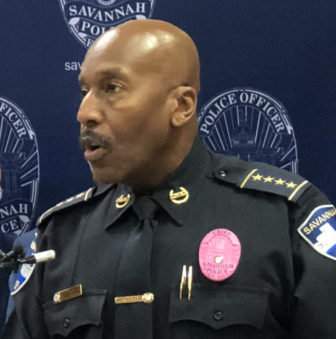
Savannah Police Department
Savannah Police Chief Roy Minter
“We need the public,” the chief added, “to come forward with any information that will assist detectives in locating and identifying those involved in this violent act. We do not want this situation to repeat itself in other areas of our city.”
So, many people thought the ramped-up, run-on of shootings in Savannah, population 144,464, would stop. But, on the night of June 11, a shooter or shooters discharged 60 bullets. Arthur Milton, 20, and Terryl Coleman, 26, were killed. Among the injured were a 13-year-old and an 18-month-old.
Bullet holes in parked vehicles and the glass doors and windows of River Pointe 1 apartments memorialized the homicides. On the ground where the victims fell, silk flowers encircled empty bottles of Hennessy cognac and votive candles bearing pictures of a Jesus with tan skin, silky brown tresses and brown eyes.
Savannah’s gun violence has soared, according to WTOC-TV’s May 2021 analysis of Savannah Police Department data, to its highest recent level since 2016. In 2017, the Savannah department split from what had been a combined city-county police force. As those numbers spiral upward, an array of residents have deepened their resolve not to just accept more gun deaths as a foregone conclusion. They are determined, they said, not to surrender. They’ve put that pledge into action by launching nonprofits, hosting weekend rallies, trying to shore up vulnerable young people and others who, as a precursor to becoming a full-on killer, sometimes start off with lesser crimes such as aggravated assault involving guns, which also have risen in recent years.
In the tourism-dependent city that Time magazine dubbed one of the "World’s Greatest Places” — with its Oak tree-canopied roads, antebellum architecture, five-star restaurants and a historic district where pedestrians can legally guzzle alcohol from plastic cups — a campaign centering the parents of those dead-by-gunfire and an array of other concerned citizens kicked off last Memorial Day.
That campaign forges on, even as certain aspects of it already have hit a snag. A first-ever anti-gun violence expert that city officials hired earlier in 2021 left after just two months on a job tasking him to tackle what was driving, over the last decade, an average of 25 gun deaths per year in Savannah.
“Everybody that’s on [the city] council has either been a victim of gun violence or has had a family member to be a victim of gun violence,” said Councilman Detric Leggett, who represents District 2, a kind of Ground Zero of Savannah’s gun violence. It covers that spot on Avery, on the edge of historic downtown, where bullets flew back in June.
“If you don’t get serious about this crime in this city, we’re going to keep going at the same level,” Councilwoman At-large Kesha Gibson-Carter, said, on Zoom, during an impassioned council meeting a few weeks after shootings. “And this is a disservice to the citizens of Savannah. Because bullets do not have names on them.”
Tasked with doing more, City Hall seeks a new gun violence expert
Several of Savannah’s eight city council members have publicly voiced their disappointment that the inaugural gun violence expert did not stick around. Some said they suspect that the expert’s approach clashed with that of police executives. Still, others said private family concerns prompted his resignation.
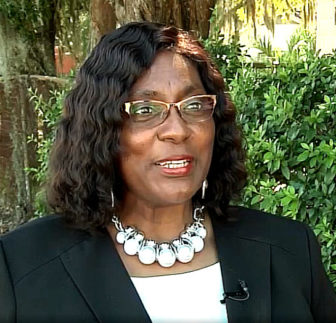
Courtesy Estella Edwards Shabazz/Facebook
Mayor Pro Tem Estella Edwards Shabazz
They are seeking a replacement for that short-tenured expert.
“We can do better … ’’ Mayor Pro Tem Estella Edwards Shabazz said, during that same Zoom meeting. “People are in place ... It’s time out, now, for the rhetoric.”
The council includes a police officer, a former police officer, community activists and executives from the Rape Crisis Center of the Coastal Empire, Ivory Bay Community Development Corp. and the Savannah chapter of the Rev. Al Sharpton’s New York-based National Action Network.
Most of them show up at crime scenes. They answer questions from TV reporters and other journalists. On social media, they plead for peace among neighbors, kin and relative strangers. They urge others to speak out and help solve crimes, especially those involving guns.
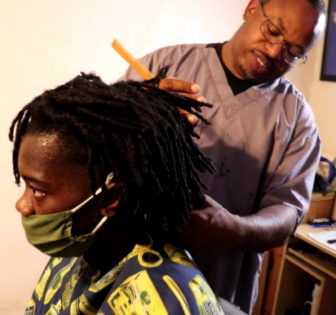
Willian Martin (video screenshot)
Councilman Detric Leggett
“We’re preparing for a hurricane,’’ said Councilman Leggett, who gives free haircuts in his home, where he also displays a funeral casket to dramatize what bullets can do. “ … It’s just like preparing yourself for the rising of the water, the damage that can come, and the collateral effect … ”
In the eye of that storm, he and other officials said, are the people, including youth and young adults, who commit aggravated assault, using guns stolen from homes, vehicles and such throughout Savannah, not just neighborhoods where gun violence has been concentrated. It’s essential to get to those youth to change course before they actually pull a trigger.
Prevention is high on the radar of City Councilwoman Linda Wilder Bryan, whose son, Lawrence Bryan IV was shot to death six years ago. He was 23, and Black. The federal Centers for Disease Control and Prevention’s “Public Crisis in the Making” report, released in February 2021, concluded that 15- to 34-year-old Black men and boys comprised 2% of the nation's population but 37% of gun homicides in 2019.
Whenever she’s on the mic at one of an increasing number, recently, of anti-gun violence rallies in Savannah, Wilder Bryan touches on the heartache and often the irresolution that’s behind those data.
“We have mothers who have no information about [homicide] cases,” Wilder Bryan told the Juvenile Justice Information Exchange, citing “cold case” gun deaths that have gone unsolved for as long as 20 years.
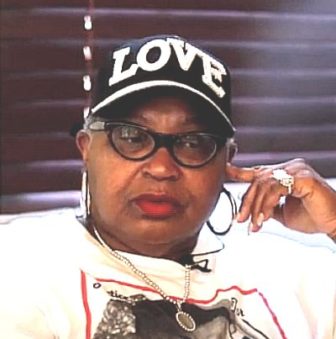
William Martin (video screenshot)
City Councilwoman Linda Wilder Bryan
“You know,” she added, regarding those cases, “they are icicles.”
The gun violence-focused nonprofit organization she launched, LB 4 & After Foundation, is among several founded in Savannah by forever-grieving parents. Leroy Williams and Olga “Lutu” Williams of Pooler, Georgia, 10 miles outside of Savannah, launched Dominique’s World hoping to make something life-saving grow from Dominique Xavier Milton Williams’ death-by-gunshot in July 2015 in upper-crust Hilton Head Beach, S.C. Williams was 17. His killer was a 15-year-old boy, who’s now in prison.
Olga Williams, the dead youth’s stepmother, is an Everytown For Gun Safety Survivor Fellow. For the last five years, the Williamses have hosted an all-male fashion show to spotlight Black manhood and to urge community members to find a healthy outlet for anger that boils over into violence.
“Philippians 4, 24 speaks about putting on a new man … ” said Leroy Williams at the July 2021 fashion show, riffing on what the Bible says about personal transformation.
“Not one more … not one more … ” the fashion show audience chanted, as the names of mainly young Black men, gunned down, were called out.
Memories of them and her own son drive Brenda Johnson-Curtis’ activism. She talks in present tense about her “Ricky,” as if he is still alive, though Ricardo Morris, 38, a restaurant chef, was shot to death six years ago. Every year, Johnson-Curtis, who helped raise his two teen-agers after her son was slain, hosts an open house, with a buffet-style feast of barbecue, red rice and other fixings.
Signs posted in her yard read, “S.N.I.T.C.H. means the family’s motto: Saving. Neighborhood. Integrity. Together. Caring. Hope.”
Savannah gun deaths, so far, in 2021 are slightly less than 2020
So far, in 2021, 22 people were shot dead in Savannah, where police have offered a $10,000 reward for tips leading to the June 11 shooter(s). During the same period in 2020, 24 people were fatally shot.
Also, regarding gun violence, Police Chief Minter reported during a July council meeting that 912 of 1,200 guns that his department had seized since January 2021 had been used in crimes. Those seizures resulted in 82 arrests on possession of firearms charges; 59 drew felony charges and 23 misdemeanor charges. Minter said he did not have comparative data from previous years.
In addition, during the same period, a total of 17 guns were stolen during 134 incidents of forced entry into vehicles; 72 guns were stolen from vehicles that were unlocked.
Real talk and a roadmap toward stemming gun violence
When it kicked off on Memorial Day weekend, Savannah’s anti-gun violence campaign has encouraged grown-ups to talk to their young, one-on-one, about the potential permanent harms of guns. There were in-home dinners, rallies at various times in various places and gatherings on Zoom. Mayor Van Johnson urged 100 days of zeroing in on the problem, including by ensuring that under-age youth are home by 11 p.m. and guns are safely locked away.
There are other practical concerns to address:
- Mustering the will and money to create recreation, jobs and other programs for Savannah’s youth.
- Filling 49 vacancies on Savannah’s 500-officer police force.
- Reviving a police athletic league that dually promotes fitness and builds rapport between law enforcement and the people they are sworn to protect and serve.
- Lessening barriers to employment for the formerly incarcerated who return to their communities.
- Addressing systemic problems of poverty that researchers have linked to gun violence.
- Working to keep gun violence from tainting Savannah’s status as a vacation destination.
- Voting on Councilman Leggett’s proposal to discharging a weapon for any reason, including, for example, to acknowledge holidays, a felony. Currently, it’s a misdemeanor.
Leggett volunteers as a football coach. He gives free haircuts and offers a listening ear to parents concerned about their children being lured into gangs. He gets the attention of some youngsters by opening the French doors next to his in-home barber’s chair, revealing a cream-colored coffin sitting atop a sofa.
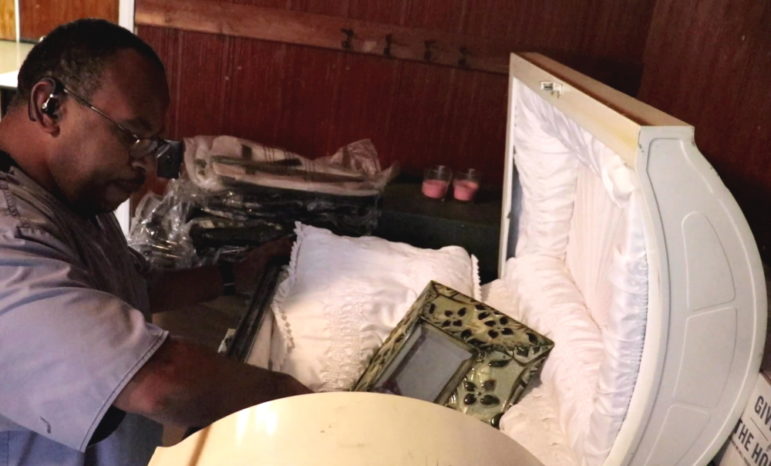
William Martin (video screenshot)
Councilman Detric Leggett with coffin in his home.
“It's a scare tactic,” he said. “But it’s a way to get the conversation started,’’
Six years ago, he positioned that casket after random gunfire fatally struck Kiaja “Kiki” Smalls while she slept on the couch in her family’s apartment on Savannah’s Southside. She was 6 years old
At a recent school backpack giveaway co-organized by Councilwoman Wilder Bryan, among the volunteers was hotel manager Rackard, who’d been so shaken by the June 11 shootings of children and young Black men.
“We came here to connect with the community,” said Rackard, president of Omar Temple No. 21, a Black Shriners organization. “We want to combat senseless violence. We take care of our own. We aren’t making excuses … We’re stepping up.”
“We,” said Mayor Johnson, standing near Rackard, wishing and hoping, “turn bad into good.